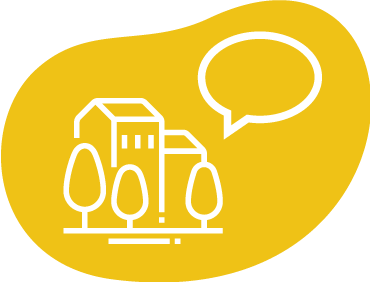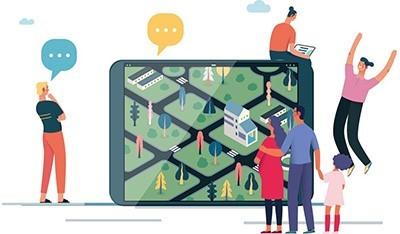The vital importance of rural territories to society must be recognised, its image and perception among urban populations and decision-makers must be improved, with a deconstruction of stereotypes.
Flagship: Revitalising rural areas most affected by population loss
A rural revitalisation platform has been set-up in June 2023 as a one-stop shop for rural communities, rural project holders and local authorities alike to collaborate, access resources in all EU languages and share information, inspiring practices and tools. The platform addresses in priority rural areas affected by population loss, ageing and lack of economic opportunities.
This platform is a free tool for people acting for rural areas, providing them with the opportunity to create community groups dedicated to specific themes, countries or regions, in English or in their national language.
Since its launch, more than 500 stakeholders have registered as members of the rural revitalisation platform and contribute to inspiring policy makers and local actors by sharing their good practices on the rural pact community platform.
Knowledge and in-person exchanges supported the implementation of the flagship action:
- The policy lab “Taking action to tackle rural depopulation” held on 29th June 2023 : gathered 100 participants and resulted in 20 good practices identified
- The High-level Rural Policy Forum “Shaping the future of rural areas” on 27th September 2023 in Sigüenza (Castilla-La Mancha, Spain) : gathered key political actors to advance the political agenda for the future of rural areas
Flagship: Creating a stronger innovation ecosystem for rural areas
The flagship on research and innovation for rural communities contributes to advance knowledge and create an enabling environment for innovation to happen in rural areas. It brings together public and private players who act for rural communities to thrive and be attractive places for innovators to work and live. The flagship:
- invests in dedicated rural research and innovation projects under Horizon Europe with close to 30 topics (calls for proposals) under Pillar II with a direct impact on rural areas beyond farming. Between 2021 and 2024 the Commission financed a total of over 60 projects contributing directly to rural areas for a budget of EUR 253 million.
- The funded projects mainly come from Cluster 6 (Food, bioeconomy, natural resources, agriculture and environment), Cluster 2 (Culture, creativity and inclusive society) and Cluster 5(Climate, energy and mobility).
- connects rural innovators through:
- the Agriculture European Innovation Partnership (EIP), addressing in priority farmers and foresters as well as related industries and value chains but now extending to rural areas more broadly under the new CAP. Several activities conducted under the scope of the EU CAP Network contributed to rural innovation :
Workshop: Young entrepreneurs - Engines of innovation in rural areas (30 Nov. - 1 Dec. 2022)
Focus Group ‘Social farming and innovations’ (final report November 2023);
- Focus Group competitive and resilient mountain areas (ongoing).
- a new European forum for startup villages, facilitating startup-driven innovation in rural areas. Two Startup Village Fora already allowed rural villages and stakeholders to meet peers and relevant actors to exchange experiences and learn from each other. A mapping tool is open to collect information from startup villages and assess enabling factors for innovation and entrepreneurship, the economic structure of villages, their innovative performance and the level of collaboration between the main players of their innovation ecosystems.
- the Agriculture European Innovation Partnership (EIP), addressing in priority farmers and foresters as well as related industries and value chains but now extending to rural areas more broadly under the new CAP. Several activities conducted under the scope of the EU CAP Network contributed to rural innovation :
See the list of rural research projects funded under Horizon Europe, as well as the AgriResearch factsheet on rural areas and communities.
See also the results of inspiring rural research projects funded under Horizon 2020 or visit the SHERPA repository.
Enhanced networking for LEADER and Smart villages
Over the past 30 years, communities have been empowered to develop local strategies with common agricultural policy funding through LEADER, extended to other funds through the so-called community-led local development. The Commission promotes enhanced networking for LEADER in the framework of the EU CAP Network. The Commission is developing a Local Action Groups directory for 2023-2027 to help LAGs find partners for cooperation projects and exchanges.
The European Commission launched in 2017 an EU action for smart villages. Since then, thanks to the European Parliament’s support, several projects and preparatory actions have helped to develop the concept, accompany villages, explore policy options to support smart villages and make it an integral part of the policy framework for the 2023-2027 period.
Discover the final report of Smart rural 21 and tools developed by Smart Rural 21 and Smart Rural 27.
Optimising land use planning
The Commission is carrying out a study on competition for land use and sustainable farming which is providing a sound and comprehensive analysis of the main impacts of sectoral developments on land use in the EU’s rural areas. The Commission will publish the final report by the end of 2024 with recommendations to foster the optimal development of land use planning to promote sustainable farming and other economic activities.
Supporting rural youth
Under the EU youth strategy 2019-2027, the Commission supports young people in rural areas under the Goal #6 ‘Moving rural youth forward’.
The role of youth in rural areas was widely emphasised during the European Year of Youth 2022 (EYY):
- The Commission organised two policy dialogues connected to rural youth with Commissioner Janusz Wojciechowski “Young people in agriculture and rural areas” and Commissioner Elisa Ferreira “Addressing brain drain: retaining and attracting talents in EU regions”.
- Over a thousand activities also contributed to the European Youth Goal #6 Moving rural youth forward.
The ‘EU-CoE Youth Partnership’ presented the study “Young people in rural areas: diverse, ignored and unfulfilled” and will publish a new study on “Opportunities for young people living in rural and remote areas in the EU in terms of non-formal learning, active citizenship and participation”. For Erasmus+ and the European Solidarity Corps, the Commission has set up a framework of inclusion measures to better reach out to a wider number of people with fewer opportunities.
See the 2022 Rural Pact conference’s session on Youth as leaders of change in rural areas (project brochure, presentations) and the April 2024 good practice webinar on “rural youth participation in policymaking” on the rural pact community platform.


